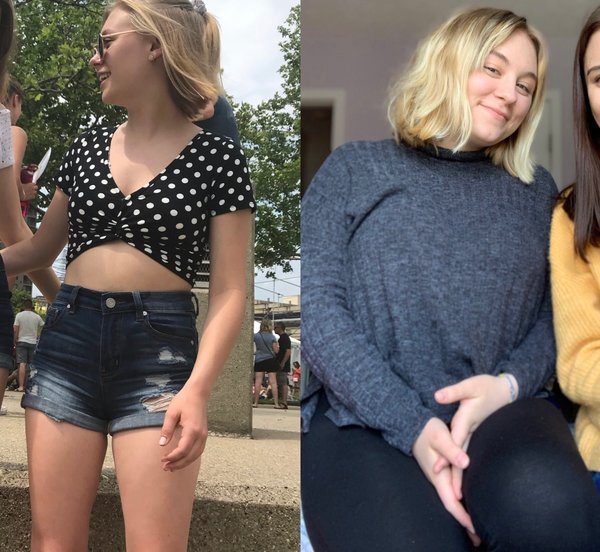I’ve pretty much always struggled with depression in some form or another. In my junior and senior year of high school, it manifested itself as an eating disorder. I hid it well, skipping lunch at school, but making sure to eat enough at dinner that my parents wouldn’t worry that I’d slipped back into the ”funk” of a few years prior. My then boyfriend and best friend both thought something was wrong, but never pressed the issue and I never volunteered anything.
But it was quietly eating away at me the whole time. I often think with math, but instead of the using numbers to observe the world around me like I do when I am happy, I was using it to count calories and calculate anticipated weight loss. My first goal was to fit into my size one pants from sixth grade, and when I accomplished that, I just set the goal lower. Feeling like I was succeeding at something was a new emotion for me.
My constant feeling in high school was one of “good, but not good enough.” I was a good student, but compared to peers who were getting straight A’s in their AP class, My 3.9 GPA felt like failure. The quarterly “Top 3 percent” dinners that the school held killed me when I would see the majority of my classmates get an invite, but not me. Every year I would audition for the school musical and get called back, but never cast. My personal best art project won just an “honorable mention” at the contest. When I tried out for the volleyball team, I made it past the first cut, but didn’t make the team. All of these partial successes felt like failure to me.
That was why it stuck when I started losing weight. I set goals, and I accomplished them. And that felt good. Of course, since I was starting at a healthy weight of 140, keeping up the pace soon became difficult. I ended up cutting all food except dinner, which I tried to eat as little as possible of without arousing suspicion. I would then “make up for it” by playing Dance Dance Revolution for a few hours on workout mode.
Sometime during this process though, I got a part time job at the ice rink. A few months in, someone told me that I could skate for free when I wasn’t working, so I thought I’d try it. I fell in love immediately. Even though I could only skate in slow circles, I felt light and even a little graceful. That’s all it took.
I started coming to the rink to practice every day that I didn’t have to work, and got the basics down soon enough. I was eager to get to jumping and spinning. At first this inspired me to lose even more weight, since figure skaters are supposed to be skinny, right? I set my new goal at 90 pounds, 20 down from where I was.
But that changed one day while I was practicing, towards the middle of my senior year. That day, I was 106 pounds. I was going into a spin, with more speed than usual and it was going surprisingly well. I threw my head back and felt the blood rush out of my head. Next thing I knew I was laying on my back on the ice, one of my coworkers next to me trying to see if I was awake.
That event was kind of an awakening for me. Until then, I had been ignoring my constant weakness, chills, and lightheadedness. But I was falling in love with skating. And I wanted to be good at it. And somewhere in the back of my mind, I knew that what I was doing was destroying my body, but it didn’t sink in until I realized that I would never get better at skating, or anything really, if I was cutting myself off at the knees by not eating.
I went to skate again the next day. I brought a protein bar to eat beforehand. I stared at it for a while, trying to will myself to forget how many calories it had, or at least to make myself not care. I made a compromise with myself that I would eat half. Even that half of a protein bar gave me more energy than I had felt in a while, and I was inspired to continue. I made an ultimatum in my head. If I don’t eat, then I don’t skate. It took a long time to climb out of the hole I’d dug for myself, but skating is what helped me start.

















